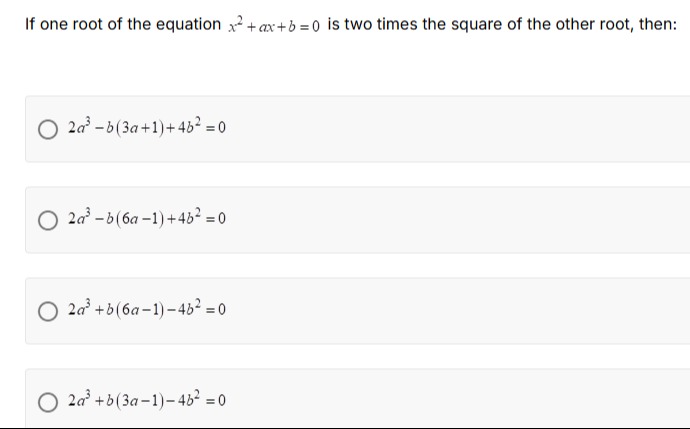Question
Question: If one root of the equation $x^2 + ax + b = 0$ is two times the square of the other root, then:...
If one root of the equation x2+ax+b=0 is two times the square of the other root, then:

A
2a3−b(3a+1)+4b2=0
B
2a3−b(6a−1)+4b2=0
C
2a3+b(6a−1)−4b2=0
D
2a3+b(3a−1)−4b2=0
Answer
2a^3 - b(6a - 1) + 4b^2 = 0
Explanation
Solution
Let the roots be α and β. Assume β=2α2.
Using Viète’s formulas for the quadratic x2+ax+b=0, we have:
α+β=−a⟹α+2α2=−a⟹a=−α(1+2α)
αβ=b⟹α⋅2α2=2α3=b
Express a and b in terms of α:
a=−α(1+2α),b=2α3
Now check Option 2: 2a3−b(6a−1)+4b2=0.
Compute:
- a3=[−α(1+2α)]3=−α3(1+2α)3 so that 2a3=−2α3(1+2α)3.
- b(6a−1)=2α3[6(−α(1+2α))−1]=2α3[−6α−12α2−1].
- 4b2=4(2α3)2=16α6.
Thus the expression becomes:
−2α3(1+2α)3−2α3[−6α−12α2−1]+16α6.
Notice that −2α3[−6α−12α2−1]=2α3(6α+12α2+1).
Also, expanding (1+2α)3=1+6α+12α2+8α3, we have:
−2α3(1+6α+12α2+8α3)=−2α3−12α4−24α5−16α6.
Adding:
−2α3−12α4−24α5−16α6+2α3+12α4+24α5+16α6=0.
Since the expression is identically zero, Option 2 is correct.
